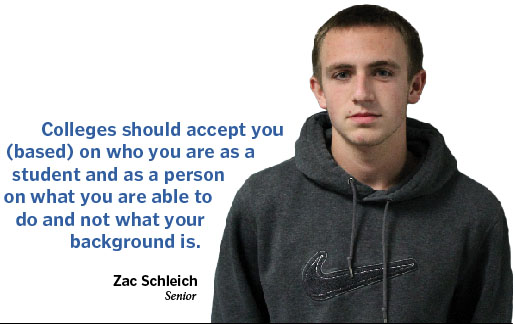 The Supreme Court began hearing the case Schuette v. Coalition to Defend Affirmative Action one month ago. The issue revolves around whether or not states are constitutionally allowed to ban racial preferences in the admissions procedures within universities; proponents believe that affirmative action serves as a form of discrimination in itself, while opponents supporting affirmative action claim such a ban violates the Equal Protection Clause of the 14th Amendment because it would disadvantage minority groups and threaten racial diversity within colleges.
The Supreme Court began hearing the case Schuette v. Coalition to Defend Affirmative Action one month ago. The issue revolves around whether or not states are constitutionally allowed to ban racial preferences in the admissions procedures within universities; proponents believe that affirmative action serves as a form of discrimination in itself, while opponents supporting affirmative action claim such a ban violates the Equal Protection Clause of the 14th Amendment because it would disadvantage minority groups and threaten racial diversity within colleges.
Senior Zac Schleich said he supports this ban due to his belief that admission into college should be solely based on merit.
“I feel that (a ban) would be valid because what race you are shouldn’t have any impact on what colleges accept you or not,” Schleich said. “They should accept you (based) on who you are as a student and as a person on what you are able to do and not what your background is.”
However, Linda Christy, College Counselor and former Associate Director of Admissions in Indiana University and DePauw University, said although colleges will become more aware of the issue of racial diversity, some already do not make it a significant factor in the admission process.
“There’s the question out there from some minority students of whether or not they have an advantage of admission because they may be Hispanic or African-American… and I can say with 100 percent certainty when I reviewed an application, I did not look at race. Students were admitted based on their ability to succeed in college,” Christy said. “Whether (applicants) are black, white, Hispanic or Asian; that’s not going to matter when it comes to admission. It’s going to matter more that they’re going to be able to complete their work in college and be successful.”






























![Keep the New Gloves: Fighter Safety Is Non-Negotiable [opinion]](https://hilite.org/wp-content/uploads/2024/12/ufcglovescolumncover-1200x471.png)















































![Video Review: Carmel Bazbeaux [MUSE]](https://hilite.org/wp-content/uploads/2024/12/Screen-Shot-2024-12-24-at-2.12.20-PM-1200x681.png)
![Review: "Our Little Secret" is a classic holiday movie: cheesy, unrealistic, unnecessarily long [MUSE]](https://hilite.org/wp-content/uploads/2024/12/lindsay-lohan-our-little-secret-netflix-2-e1734904489539-1200x780.jpg)
![Video Review: Carmel BuffaLouie's [MUSE]](https://hilite.org/wp-content/uploads/2024/12/Screen-Shot-2024-12-24-at-2.08.33-PM-1200x685.png)
![Review: Dress to Impress’s Christmas update beats the Halloween update, checks all boxes [MUSE]](https://hilite.org/wp-content/uploads/2024/12/Dti-winter-update.webp)
![Review: "Moana 2": Is the storyline just as intense as advertised? [MUSE]](https://hilite.org/wp-content/uploads/2024/12/1-copy-1024x538-1.webp)
![Review in Print: Maripaz Villar brings a delightfully unique style to the world of WEBTOON [MUSE]](https://hilite.org/wp-content/uploads/2023/12/maripazcover-1200x960.jpg)
![Review: “The Sword of Kaigen” is a masterpiece [MUSE]](https://hilite.org/wp-content/uploads/2023/11/Screenshot-2023-11-26-201051.png)
![Review: Gateron Oil Kings, great linear switches, okay price [MUSE]](https://hilite.org/wp-content/uploads/2023/11/Screenshot-2023-11-26-200553.png)
![Review: “A Haunting in Venice” is a significant improvement from other Agatha Christie adaptations [MUSE]](https://hilite.org/wp-content/uploads/2023/11/e7ee2938a6d422669771bce6d8088521.jpg)
![Review: A Thanksgiving story from elementary school, still just as interesting [MUSE]](https://hilite.org/wp-content/uploads/2023/11/Screenshot-2023-11-26-195514-987x1200.png)
![Review: "When I Fly Towards You", cute, uplifting youth drama [MUSE]](https://hilite.org/wp-content/uploads/2023/09/When-I-Fly-Towards-You-Chinese-drama.png)
![Postcards from Muse: Hawaii Travel Diary [MUSE]](https://hilite.org/wp-content/uploads/2023/09/My-project-1-1200x1200.jpg)
![Review: "Ladybug & Cat Noir: The Movie," departure from original show [MUSE]](https://hilite.org/wp-content/uploads/2023/09/Ladybug__Cat_Noir_-_The_Movie_poster.jpg)
![Review in Print: "Hidden Love" is the cute, uplifting drama everyone needs [MUSE]](https://hilite.org/wp-content/uploads/2023/09/hiddenlovecover-e1693597208225-1030x1200.png)
![Review in Print: "Heartstopper" is the heartwarming queer romance we all need [MUSE]](https://hilite.org/wp-content/uploads/2023/08/museheartstoppercover-1200x654.png)




